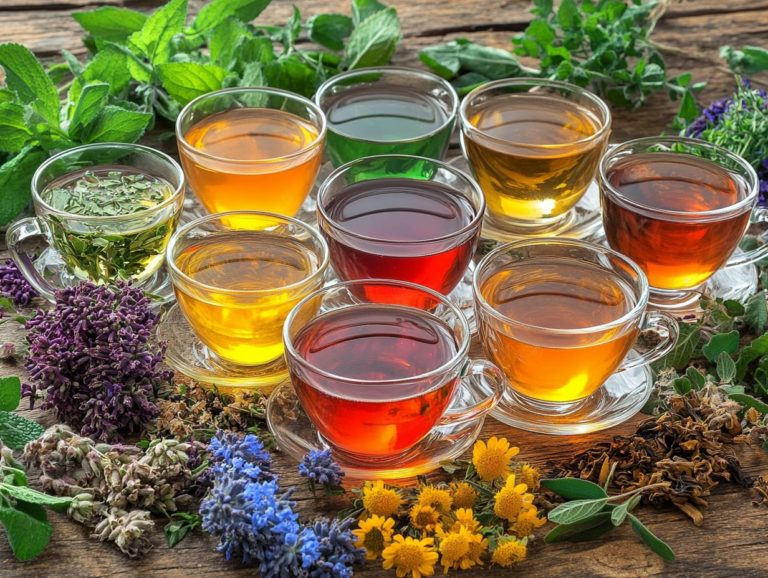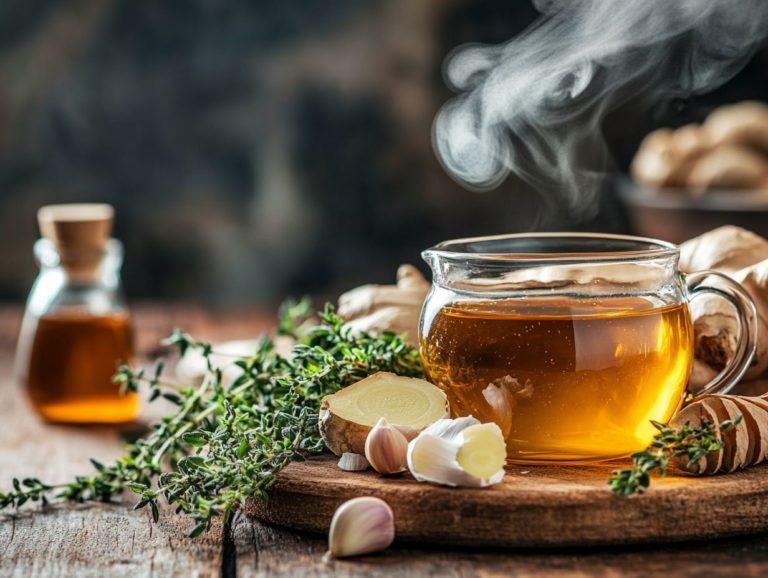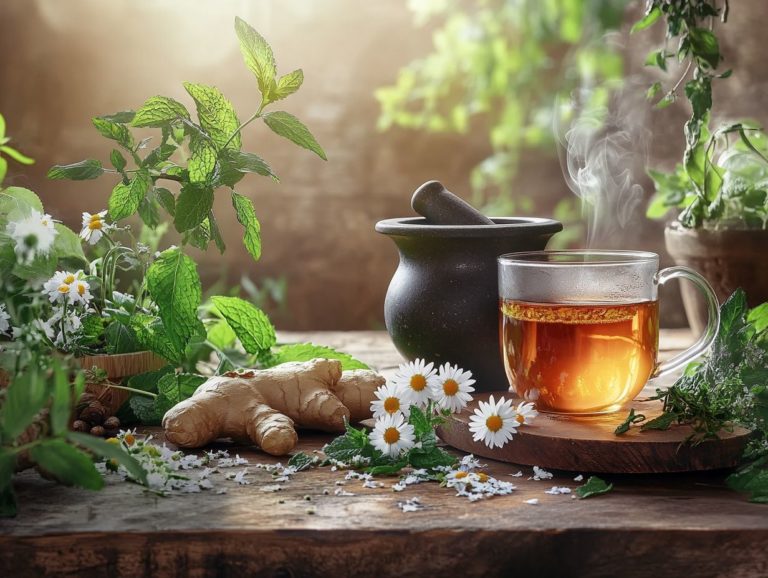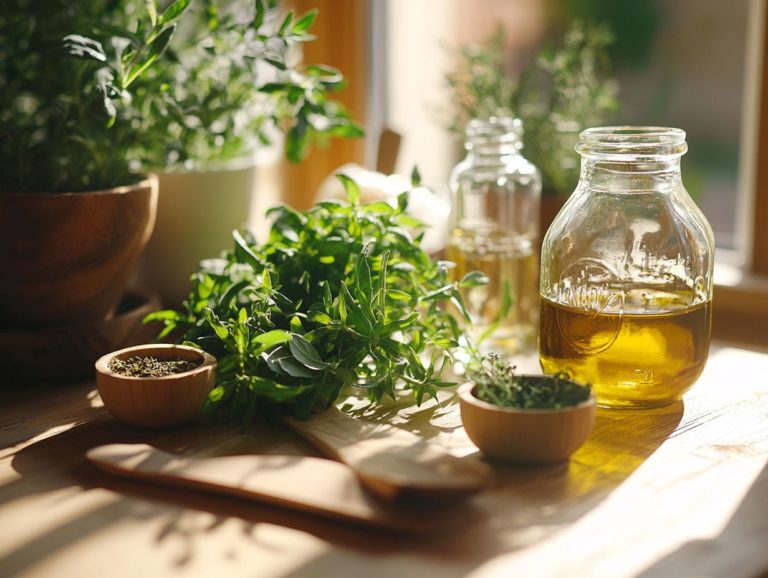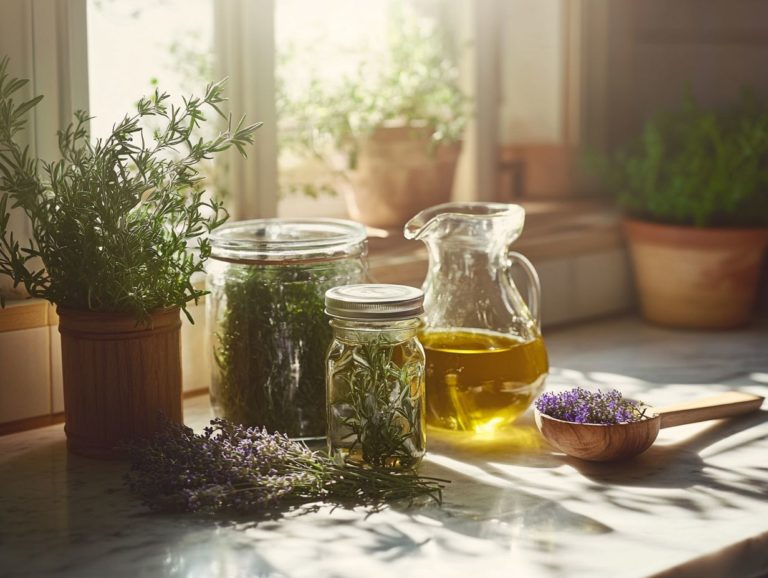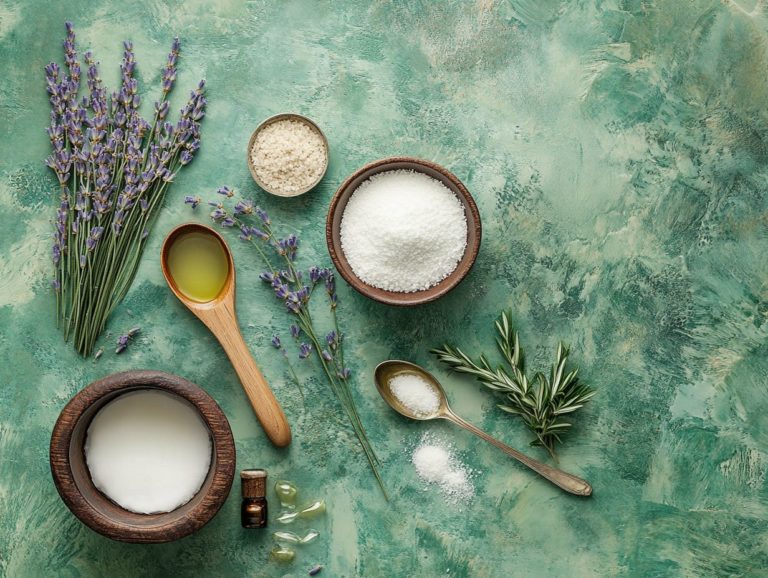5 Delightful DIY Herbal Teas for Wellness
Looking for a soothing way to elevate your health? Herbal teas might just be your perfect solution.
Dive into five delightful DIY herbal tea recipes designed to tantalize your taste buds while promoting wellness. Experience the zesty refreshment of Lemon and Ginger Tea or indulge in the calming blend of Chamomile and Lavender. Each brew offers unique benefits.
You ll discover the advantages of harnessing herbs, along with tips for crafting the perfect cup. You can easily add these revitalizing drinks to your daily routine.
Get ready to sip your way to vibrant health today!
Contents
- Key Takeaways:
- 1. Lemon and Ginger Tea
- 2. Chamomile and Lavender Tea
- 3. Peppermint and Lemon Balm Tea
- 4. Turmeric and Cinnamon Tea
- 5. Rosehip and Hibiscus Tea
- Why Choose Herbal Teas for Wellness?
- What Are the Benefits of Using Herbs in Tea?
- How Can Different Herbs Help with Different Health Concerns?
- What Are Some Tips for Making the Perfect Cup of Herbal Tea?
- Are There Any Potential Side Effects of Drinking Herbal Tea?
- How Can One Incorporate Herbal Teas into Their Daily Routine for Maximum Benefits?
- Frequently Asked Questions
- What are some benefits of incorporating herbal teas into my wellness routine?
- How can I make my own herbal teas at home?
- Can I mix different herbs together to create my own unique herbal tea blend?
- What are some popular herbal teas for wellness?
- Are there any potential risks or side effects of drinking herbal teas?
- Can herbal teas be used to treat specific health conditions?
Key Takeaways:
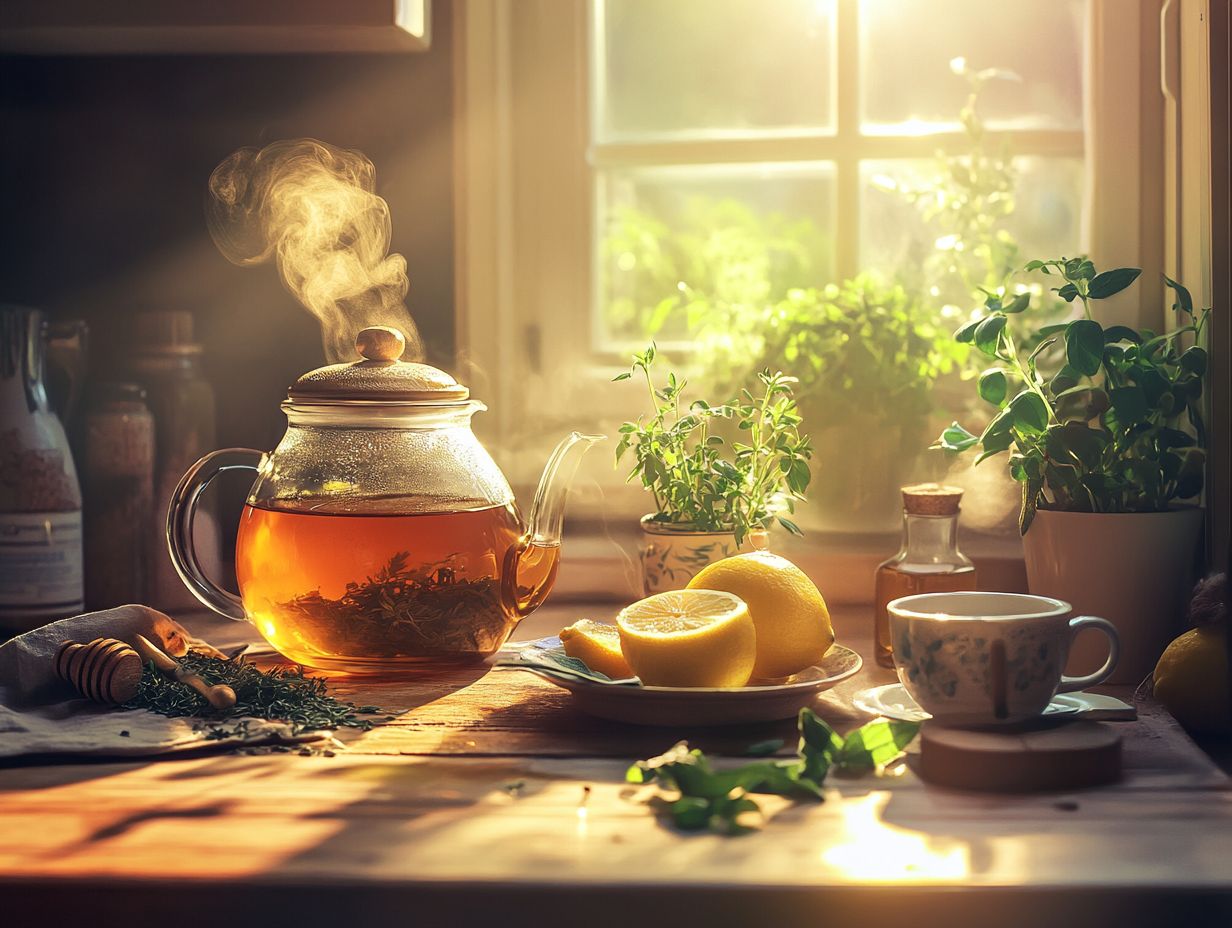
- Boost immunity with turmeric and cinnamon tea.
- Unwind with calming chamomile and lavender tea.
- Fight stress with refreshing lemon and ginger tea.
1. Lemon and Ginger Tea
Lemon and ginger tea is not just a drink; it s a delightful experience that tantalizes your taste buds while offering a wealth of health benefits. It s no wonder this blend has become a favorite for herbal tea enthusiasts seeking natural remedies.
Picture the zesty flavor of fresh lemon harmonizing with the warming properties of ginger. This combination creates a refreshing beverage that supports your immune system and boosts your energy perfect for any time of day.
Lemon is packed with antioxidants that help combat free radicals. Ginger helps reduce inflammation and promotes digestive health. Brewing this tea is easy; simply steep freshly grated ginger and a splash of lemon juice in hot water for a bright, flavorful infusion. If fresh ingredients are hard to find, dried herbs work just as well.
Feel free to get creative with these variations:
- Adding honey for a touch of sweetness
- Tossing in a pinch of turmeric for an extra health boost
- Sprinkling cayenne pepper for a spicy kick
These options allow you to customize each cup to suit your preferences. Enjoy the journey of flavors and health benefits this invigorating tea brings.
2. Chamomile and Lavender Tea
Chamomile and lavender tea is an exquisite blend that marries the calming properties of chamomile flowers with the enchanting essence of lavender. It s perfect for unwinding after a long day.
This delightful infusion fosters a sense of tranquility that many seek in their evening rituals. Chamomile may help ease anxiety, while lavender is celebrated for promoting restful sleep.
To brew this heavenly concoction, steep one teaspoon of dried chamomile and one teaspoon of dried lavender buds in boiling water for about 5-10 minutes. To make it part of your nightly routine, enjoy a warm cup in a cozy atmosphere, perhaps accompanied by soft music or a captivating book. Let the gentle aromas embrace you as you prepare for a peaceful night s rest.
3. Peppermint and Lemon Balm Tea
Peppermint and lemon balm tea is a refreshing herbal infusion that combines the invigorating taste of peppermint leaves with the light, citrusy notes of lemon balm. This brew not only refreshes but also offers digestive benefits.
This combination is effective for easing discomfort like bloating and gas, making it an excellent choice for soothing your stomach. Peppermint relaxes the muscles of your gastrointestinal tract, while lemon balm helps lower stress levels, a common contributor to digestive issues.
During a herbal detox, this tea blend is your invaluable ally, promoting the removal of harmful substances from your body. For the best experience, steep a teaspoon of each herb in boiling water for about 5-10 minutes. To elevate the flavor and gain additional health benefits, consider adding a touch of honey or a slice of ginger. You might also explore 5 common herbs with healing properties that can enhance your detox experience.
4. Turmeric and Cinnamon Tea
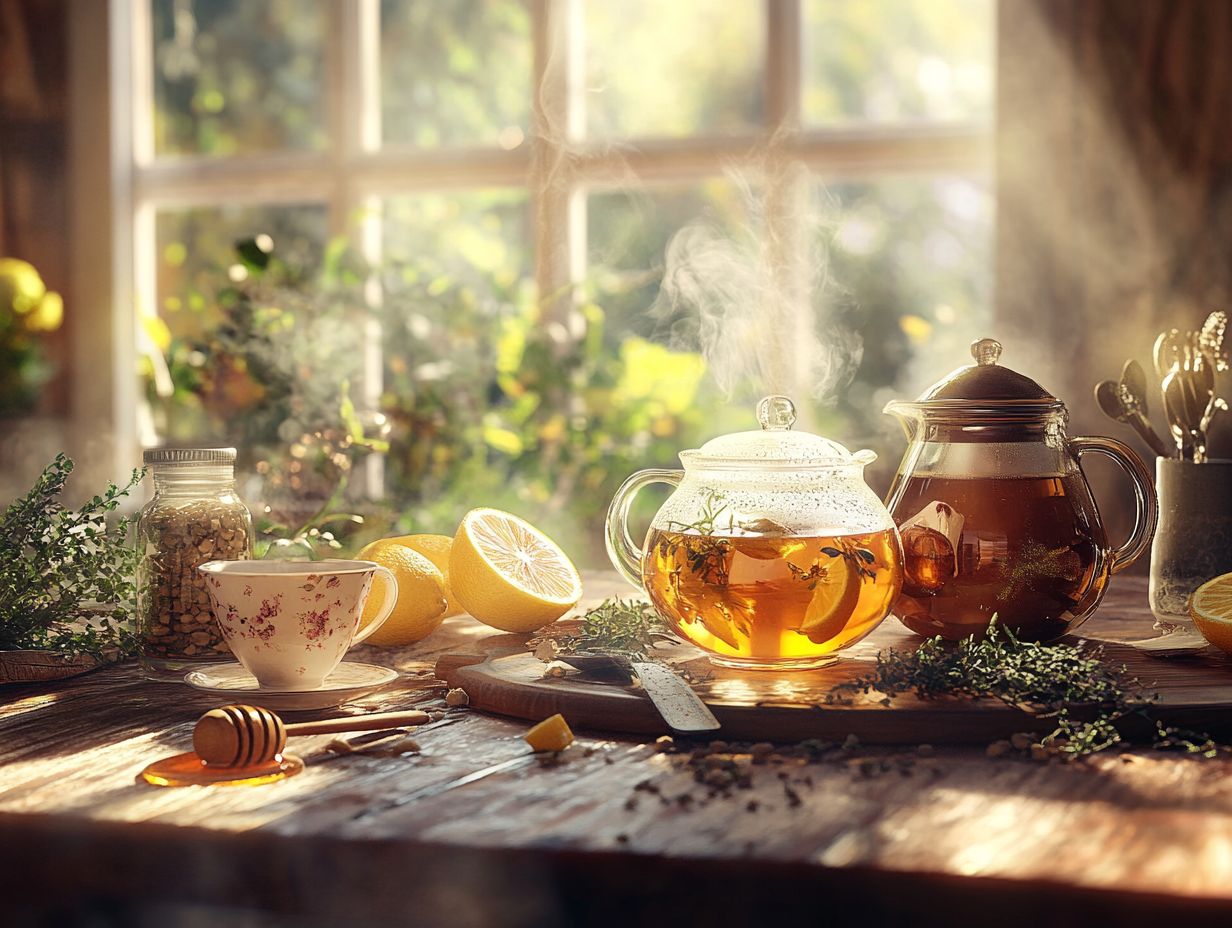
Turmeric and cinnamon tea is a delightful herbal chai that combines the earthy richness of turmeric root with the warm spice of cinnamon. This tea brings an array of health benefits and soothing properties to elevate your wellness routine.
These two powerful ingredients do more than tantalize the taste buds. They offer impressive anti-inflammatory and antioxidant effects that support your immune system and promote overall health. Turmeric is rich in curcumin, renowned for its inflammation-fighting prowess. Meanwhile, cinnamon is loaded with antioxidants that protect your body from oxidative stress.
Brewing this revitalizing tea is simple. Just combine freshly grated turmeric with a cinnamon stick in boiling water and let it steep for about 10 minutes. For an extra layer of flavor and a boost in curcumin absorption, add a touch of honey or a dash of black pepper. You can savor a deliciously aromatic sip while boosting your wellness.
5. Rosehip and Hibiscus Tea
Rosehip and hibiscus tea presents a vibrant herbal infusion that delights the senses. It marries the tartness of hibiscus flowers with the fruity essence of rose hips. This flavorful tea is not just a treat for your taste buds; it s also a rich source of antioxidants that supports your overall health.
This blend not only pleases your palate but also nurtures your immune system and enhances your skin’s vitality. The high vitamin C content in rosehip invigorates your body’s defenses, while hibiscus helps reduce inflammation and promotes radiant skin.
To indulge in this invigorating beverage, steep one tablespoon of the dried mixture in hot water for about 10-15 minutes. For a refreshing twist, serve it iced with a touch of honey, or blend it into smoothies for an extra nutrient boost. It s a versatile favorite you can enjoy all year round.
Why Choose Herbal Teas for Wellness?
Discovering herbal teas for wellness is an exciting journey that can transform your health! These natural remedies provide a wealth of benefits, from boosting your energy levels to enhancing your immune system. Herbal tea is an essential part of a healthy lifestyle.
Teas like chamomile, peppermint, and ginger not only offer soothing flavors but also aid in relaxation and digestion. Chamomile is famous for its calming properties that help reduce stress. Ginger tea is often your go-to for alleviating nausea and promoting better digestion.
To truly harness the power of these herbal infusions, integrate them into your daily rituals. Start your day with a refreshing cup of peppermint or unwind with chamomile before bed to encourage restful sleep. This mindful incorporation turns a simple beverage into a powerful ally for your well-being.
What Are the Benefits of Using Herbs in Tea?
Using herbs in tea opens the door to a wealth of health benefits. Each herb presents unique properties that contribute to both physical and mental well-being, making herbal tea an incredibly versatile option for those seeking natural remedies.
Take chamomile, for example; it s renowned for its soothing effects, easing anxiety and promoting restful sleep. Then there’s ginger, which invigorates the body, aids digestion, and helps reduce inflammation. Peppermint not only refreshes your palate but is also effective for relieving headaches and digestive discomfort.
These herbs enhance your tea’s flavor and naturally help tackle various health issues. For those new to herbal remedies, exploring 5 essential herbal preparations for beginners can provide a great starting point. This flexibility allows you to customize your tea selection to suit your individual needs perfectly.
How Can Different Herbs Help with Different Health Concerns?
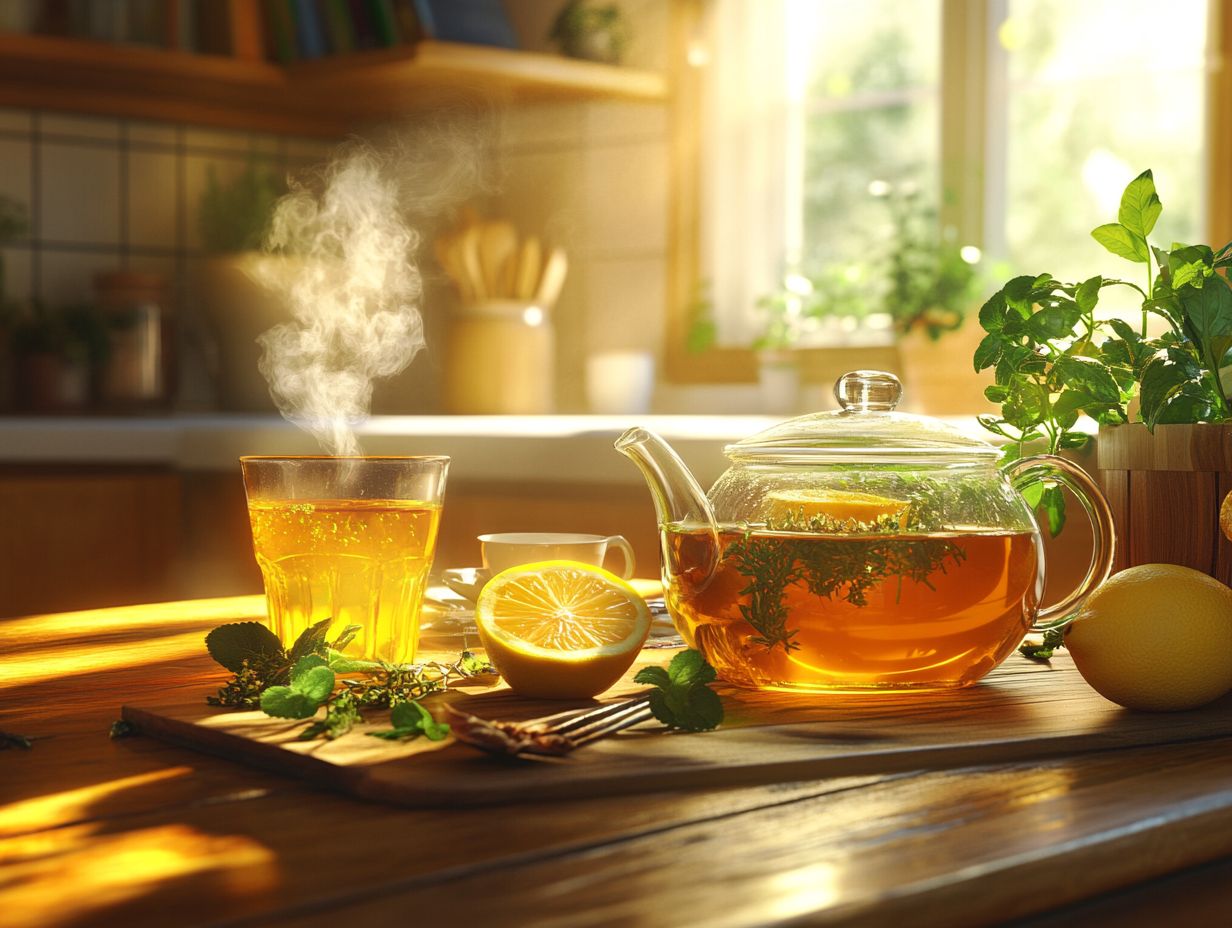
Different herbs can serve as powerful allies in addressing your health concerns. Their unique properties target specific issues and provide soothing relief while enhancing your overall well-being.
Take chamomile, for example. It s celebrated for its calming effects, making it an excellent choice if you’re grappling with anxiety or sleep disturbances.
Peppermint, on the other hand, can be a game-changer for digestive troubles like bloating or indigestion. Ginger is often hailed for its anti-inflammatory benefits, helping alleviate joint pain and nausea.
To craft effective tea combinations tailored to your health needs, consider blending chamomile with lavender for a delicately relaxing brew. You can also mix ginger with lemon balm to tackle stress while soothing your stomach. Additionally, exploring DIY herbal remedies for digestive health can enhance your wellness. By experimenting with different proportions, you can discover what truly resonates with your unique health challenges.
What Are Some Tips for Making the Perfect Cup of Herbal Tea?
Crafting the perfect cup of herbal tea requires understanding the unique characteristics of your herbal ingredients, whether they are fresh or dried. Knowing this helps you make the most of your herbal tea experience!
Steeping Time
Start by considering the recommended steeping time for each herb. For instance, chamomile only needs 5-7 minutes to release its soothing qualities. Hibiscus prefers a more leisurely 10-15 minutes to truly shine.
Herb Combinations
The temperature of your water is equally important. Delicate leaves thrive at around 170 F, while heartier herbs can withstand boiling water without losing their essence.
Don’t underestimate the power of complementary herbs; selecting the right combinations can elevate your tea experience. Pairing refreshing mint with soothing lemongrass creates a delightful balance, allowing the flavors to meld beautifully while delivering an array of health benefits. For those interested in more options, check out these top 5 DIY herbal remedies for stress relief.
Are There Any Potential Side Effects of Drinking Herbal Tea?
While herbal tea is often celebrated for its myriad health benefits, it s crucial to be mindful of potential side effects that certain herbs may pose especially if you have specific health concerns or are on medication.
For example, chamomile could provoke allergic reactions in those sensitive to plants belonging to the daisy family. Valerian root might induce drowsiness or digestive issues if consumed in excess.
Some herbs have the potential to interact with prescription medications, making it essential to approach herbal consumption with a discerning eye.
To enjoy herbal teas safely, start with small amounts to assess your tolerance. Gradually increase the dosage if no adverse effects occur. Consulting with healthcare professionals is always a prudent choice, particularly if you have chronic conditions or are pregnant, to ensure your herbal tea selections won t adversely affect your health.
How Can One Incorporate Herbal Teas into Their Daily Routine for Maximum Benefits?
Incorporating herbal teas into your daily routine can be a delightful way to enhance your wellness journey, offering a wealth of health benefits while easily fitting into your lifestyle.
Imagine starting your morning with a refreshing cup of peppermint tea; it s a perfect way to awaken your senses and set a positive tone for the day ahead.
During those afternoon breaks, consider brewing a calming chamomile blend to ease stress and carve out a moment of tranquility amidst your busy schedule.
As evening approaches, a soothing infusion of lavender and lemon balm can help you unwind and prepare for a restful night s sleep.
Creating your own herbal tea blends at home is a breeze! Try mixing dried ginger with lemon zest for an invigorating boost. You can also combine hibiscus and rose hips for a tart, fruity flavor that delivers a delightful dose of vitamin C.
Embracing these rituals allows you to seamlessly weave herbal teas into your life, promoting both wellness and relaxation.
Frequently Asked Questions
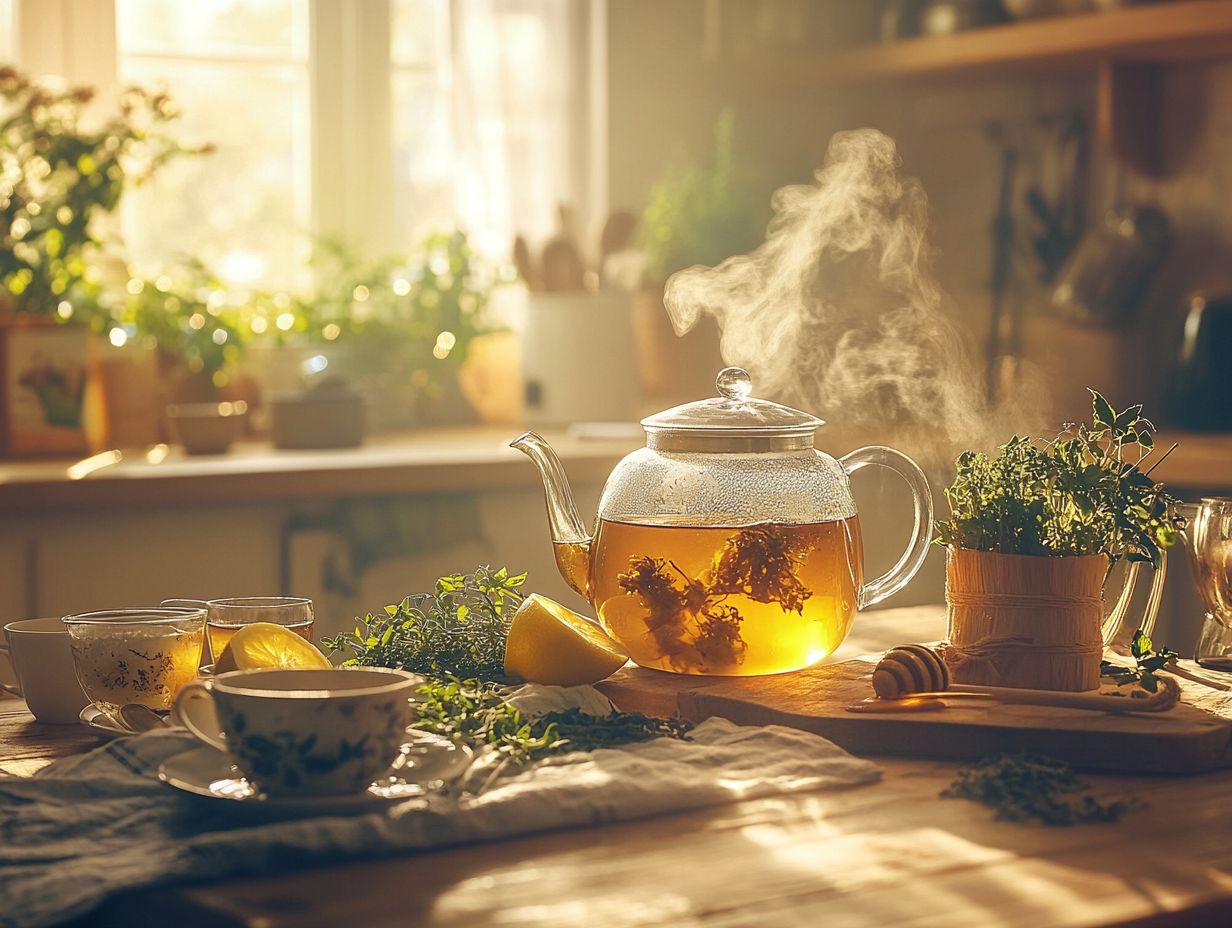
Don’t wait! Start your wellness journey today with these delicious herbal teas! Share your favorite herbal tea recipes or experiences in the comments below to engage with our community!
What are some benefits of incorporating herbal teas into my wellness routine?
Herbal teas are warm and comforting. They also offer health benefits like boosting the immune system and improving digestion.
Additionally, they can help reduce stress and promote better sleep.
How can I make my own herbal teas at home?
Making herbal teas at home is simple and cost-effective. Start by choosing your favorite herbs like chamomile or mint.
Soak them in hot water for 5-10 minutes. You can enhance the flavor with honey or lemon!
Can I mix different herbs together to create my own unique herbal tea blend?
Absolutely! Mixing different herbs can be fun and rewarding.
Just remember to research their effects and the right amounts to use.
What are some popular herbal teas for wellness?
Popular herbal teas include chamomile for relaxation and peppermint for digestion.
Ginger boosts immunity, while lavender helps with stress relief. There are countless options for delicious and beneficial teas!
Are there any potential risks or side effects of drinking herbal teas?
Herbal teas are generally safe, but check with a healthcare professional first.
Some herbs can interact with medications, so do your research before diving in.
Can herbal teas be used to treat specific health conditions?
Herbal teas can support your wellness routine but shouldn’t replace medical treatment.
They may help relieve certain symptoms, making them a great supplement!

